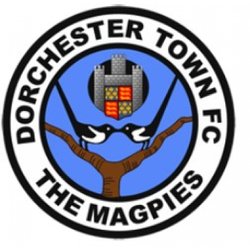
Dorchester Town
Premier Division - ClubsAddress
Contacts
History
Dorchester Town Football Club was formed on the 21st October 1880, at a meeting in the Kings Arms. According to newspaper records, it was “resolved to resuscitate a Dorchester Football Club and Officers” suggesting that a club existing prior to 1880 – though the original founding date it unknown.
The club participated in the Dorset League from 1896 to 1947, and the Western League between 1947 and 1972, before joining the Southern League, where they remained until gaining entry into the newly formed Football Conference South in 2004.
The Magpies won the Championship of the Dorset League in 1937/38, and the Championship of the Western League in 1954/55.
After joining the Southern League in 1972 the early years were a struggle, and it was not until season 1977/78 that the Club first tasted success, when they finished as runners up to Margate in Division One (South) and were promoted into the Premier Division. At the end of the following season, after a difficult campaign, The Alliance League (now the Conference) was formed and The Magpies found themselves back in the reformed Southern Division.
Dorchester then celebrated their centenary by winning the Championship of Division One (South) in 1979/80, by a one-point margin over Aylesbury. Relegated from the Premier Division at the end of the 1983/84 season, following a severe financial crisis, they only just avoided dropping out of the League in season 1985/86. However, a remarkable transformation was achieved, and Dorchester returned to the Premier Division as Champions at the end of the following season.
For most of the seasons that they were back in the Premier Division, Dorchester were a mid table team, but in season 1993/94, following a poor start to the campaign, Stuart Morgan was appointed manager, and having succeeded in steering the Club out of the relegation zone, he took The Magpies to sixth position the following season.
Season 1997/98 saw The Magpies achieve their highest ever Premier Division placing when they finished in fourth place, but the next two seasons were very disappointing, with relegation only just being avoided on both occasions. After a poor start to the season, manager Stuart Morgan was relieved of his position as manager in September 1999, and was replaced by Mark Morris. Mark was able to steer the Club out of the relegation zone in his first season, but sadly he was unable to repeat the feat the following season, when The Magpies lost the Premier Division place that they had held for fourteen seasons. The Magpies threatened to regain their Premier Division status in their first season in the Eastern Division, but finished in third place behind Champions Hastings Town and Runners Up Grantham Town, however they achieved their objective the following season, when after a fine campaign, with only five defeats, the Club returned to the Premier Division as Champions.
In season 2003/04 Dorchester won The Southern League end of season play off competition, defeating Bath City in the Semi-Final and Tiverton Town in the Final, played at Exeter City’s St. James Park, to gain entry to the newly formed Conference South. Following their elevation to the Conference regional division, apart from the first two and the two seasons immediately prior to last season, they invariably struggled in the lower half of the table, indeed the season before last The Magpies finished in their highest position to date when they attained eighth place, which was a great achievement for the small market town of Dorchester with a population of 15,000. Sadly last season was a nightmare campaign, and The Magpies finished rock bottom and were relegated back into The Southern League.
Perhaps commensurate with their struggle to stabilise their position in the Conference South, not surprisingly there have been a number of managerial appointments since Mark Morris decided to resign after seven seasons at the helm at the end of season 2005/06. Over the following four seasons there were five managers, including one who undertook a caretaker role, but Ashley Vickers, who was appointed in November 2009, appeared to have succeeded in steadying the ship. Unfortunately, as is so often the case, Ashley was relieved of his duties in October 2011 following a run of poor results, and was initially replaced on a caretaker basis by Assistant Manager Phil Simkin, who took the reigns with support from long serving player Mark Jermyn, before Portsmouth legend Alan Knight was appointed to the post in late November 2011, with Simkin reverting to his former role. Knight then resigned his post just prior to Easter 2012, and Phil Simkin was once again asked to step into the breach, this time on a permanent basis assisted again by Player Coach Mark Jermyn together with a newly appointed Assistant Manager Stuart Heath. However Jermyn decided to leave the club at the end of last season and signed for Poole Town. In late August 2014 Phil Simkin was relieved of his position, and Stuart Heath took over the managerial role on an interim basis, before handing over the reins to Graham Kemp, who was appointed to the position in September 2014, with Heath reverting back to his former role of Assistant Manager. In January 2015 Graham Kemp decided to resign from his post following a poor run of results, and Mark Jermyn returned as Player Manager in his place, supported by another long serving player Nick Crittenden and Stuart Heath.
The Magpies have enjoyed significant success in cup competitions over the years, and have reached the Second Round Proper of the FA Cup on four occasions, including the fine achievement in season 2012 – 13 when they eliminated Sky Bet League Two side Plymouth Argyle in the First Round Proper at The Avenue Stadium, a game which was televised live on ESPN, and the first time The Magpies had eliminated a Football League side. However they were then knocked out in the next round by Luton Town at Kenilworth Road. The most recent run to the Second Round Proper, prior to 2012, was in 1981, when they lost to AFC Bournemouth after a replay, before a crowd of 8700 at Dean Court. Previously they had played York City and Plymouth Argyle, both in the 1950’s. They have also reached the First Round Proper on six other occasions, with their opponents being Norwich City, QPR, and Port Vale, again all in the 1950’s, Gloucester City in 1989 – 90, Oxford United in 1995 – 96, and finally in 2000 – 01 when Wigan Athletic were the opposition at The JJB Stadium, when The Magpies went down 3-1 after a fine display.
In the FA Trophy The Magpies have twice reached the last sixteen, firstly in 1971 – 72 when they lost to the holders Telford United after a replay, and then again in 1996 – 97 losing to eventual winners Woking.
The Magpies, then in the Eastern Division, won the Southern League Cup competition in season 2001 – 02, convincingly defeating then Premier Division King’s Lynn by an aggregate score of 4-0 in the two leg Final. Prior to that Dorchester’s most successful season in that competition was 1991 – 92 when they finished as runners up to Dover Athletic. Previously they reached the semi-finals in 1981 – 82 when they lost to Wealdstone, and they reached the same stage again in 1998 – 99 when they were defeated by Cambridge City.
Dorchester have won the Dorset Senior Cup on twelve occasions, the most recent being season 2011 – 2012 when Wimborne Town were beaten in the Final played at the County Ground at Hamworthy.
Dorchester moved to their current ground, The Avenue Stadium in August 1990, which is literally a few yards down the road from their old home. The ground stands on land owned by the Duchy of Cornwall, and Prince Charles, in his role as Duke of Cornwall, took an active interest in it’s design, making a number of private visits during construction, before officially opening the ground on the 20th November 1991. A Tesco supermarket has been built on the Club’s previous ground, which they had occupied since 1929. The highest attendance for a league game at The Avenue Stadium is 4129 for the match against Weymouth on the 1st January 1999, although the stadium capacity is 5009, with seating for 710.
The Evo-Stik South newsletter
Keep up-to-date with our exclusive email newsletters.
Subscribe







